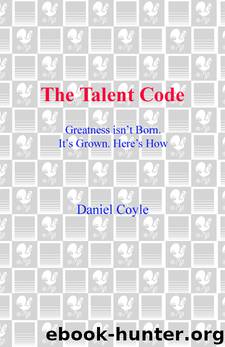The Talent Code: Greatness Isn't Born. It's Grown. Here's How. by Coyle Daniel

Author:Coyle, Daniel [Coyle, Daniel]
Language: eng
Format: epub
Tags: Business
ISBN: 9780553806847
Barnesnoble:
Goodreads: 7094921
Publisher: Bantam
Published: 2009-04-28T00:00:00+00:00
Chapter 6
The Curaçao Experiment
The whole island jumped.
—Lucio Anthonia, Curaçao Little League parent
THE EARTHQUAKE
Every August at the Little League World Series in Williams-port, Pennsylvania, a team of eleven- and twelve-year-old boys from Curaçao stages a vivid reenactment of David versus Goliath. Actually, it's more like David versus fifteen Goliaths. In a sixteen-team tournament frequently dominated by hulking, flame-throwing man-boys, this wiry, under-size team of nobodies from a tiny, remote Caribbean island somehow keeps succeeding.*1 In a worldwide competition where qualifying two consecutive years is considered a remarkable achievement, the Curaçao boys have made it to the semifinals six times in the last eight years, winning the title in 2004 and finishing second in 2005. As ESPN announcers have christened it, Curaçao is the Little Island That Could.
Curaçao's accomplishments are even more impressive for the fact that compared with the teams they beat, they have precious few facilities. (There are only two Little League–regulation fields on the entire island, and one batting cage constructed of tattered fishnet.) What's more, the Curaçao baseball season lasts but five months; practices are held three times a week, and games are on weekends, a schedule that contrasts markedly with the year-round approach of other places like Venezuela. When I saw them in Williamsport at the 2007 series, the younger members of the Curaçao team were bemused by the spectacle of the Japanese team doing drills before breakfast. (“Why do they do that?” one player asked me, mystified.)
The most compelling element of this underdog story, however, is that Curaçao's success can be traced to a single moment of ignition—actually two moments, lasting approximately three seconds each. They both happened at Yankee Stadium on October 20, 1996, in the opening game of the World Series between the Atlanta Braves and the New York Yankees. Like many moments of ignition, this one fascinates because it hangs so heavily on chance, literally on the postage-stamp-size area of contact created when a round bat meets a round ball. One-eighth of an inch either way, and, if history is any guide, the Curaçao phenomenon would not have happened.
The situation at Yankee Stadium seemed unpromising: no score, top of the second inning, Braves runner on first base. An unknown nineteen-year-old Curaçaoan rookie named Andruw Jones stood at the plate waggling his bat, a Mona Lisa smile creasing his chubby face. Jones had started his season at the single-A level of the minor leagues; he'd been promoted to the majors only two months earlier. The Yankee ace, Andy Pettitte, stared him down with the somber expression of a bullfighter. Pettitte was only a few years older but in this image the narrative was clear: canny veteran versus naïve rookie.
Pettitte worked the count full, then unleashed his best pitch: a nasty slider. The intention was to induce the rookie to do what most rookies do in that situation: get fooled, reach for the pitch, and ground it into a double play But Jones was not most rookies. Jones recognized the spin on the slider and slammed the pitch ten rows into the left-field seats.
Download
This site does not store any files on its server. We only index and link to content provided by other sites. Please contact the content providers to delete copyright contents if any and email us, we'll remove relevant links or contents immediately.
Rewire Your Anxious Brain by Catherine M. Pittman(18656)
Talking to Strangers by Malcolm Gladwell(13370)
The Art of Thinking Clearly by Rolf Dobelli(10489)
Mindhunter: Inside the FBI's Elite Serial Crime Unit by John E. Douglas & Mark Olshaker(9344)
Becoming Supernatural by Dr. Joe Dispenza(8217)
Change Your Questions, Change Your Life by Marilee Adams(7783)
Nudge - Improving Decisions about Health, Wealth, and Happiness by Thaler Sunstein(7709)
The Road Less Traveled by M. Scott Peck(7603)
The Lost Art of Listening by Michael P. Nichols(7506)
Mastermind: How to Think Like Sherlock Holmes by Maria Konnikova(7347)
Enlightenment Now: The Case for Reason, Science, Humanism, and Progress by Steven Pinker(7314)
Win Bigly by Scott Adams(7199)
The Way of Zen by Alan W. Watts(6614)
Daring Greatly by Brene Brown(6514)
Big Magic: Creative Living Beyond Fear by Elizabeth Gilbert(5774)
Grit by Angela Duckworth(5615)
Ego Is the Enemy by Ryan Holiday(5450)
Men In Love by Nancy Friday(5240)
The Laws of Human Nature by Robert Greene(5208)
